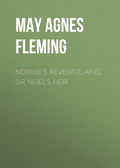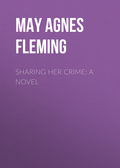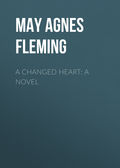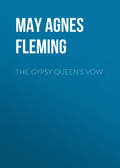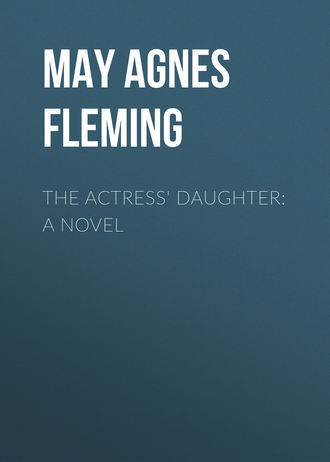
May Agnes Fleming
The Actress' Daughter: A Novel
CHAPTER XIII
AWAKENING
"Her cheek too quickly flushes; o'er her eye
The lights and shadows come and go too fast,
And tears gush forth too soon, and in her voice
Are sounds of tenderness too passionate
For peace on earth."
I believe the established and time-honored precedent in writing stories is to bring the chief characters safely through sundry "hair-breadth escapes by flood and field," annihilate the vicious, make virtue triumphant, marry the heroine, and then, with a grand final flourish of trumpets, the tale ends.
Now, I hope none of my readers will be disappointed if in this "o'er true tale" I depart from this established rule. My heroine is married, but the history of her life cannot end here. Perhaps it would be as well if it could, but truth compels me to go on and depict the dark as well as the bright side of a fiery yet generous nature – a nature common enough in this world, subject to error and weakness as we all are, and not in the least like one of those impossible angels oftener read of than seen.
Jane Eyre says a new chapter is like a new scene in a play. When the curtain rises this time, it discloses an elegantly furnished parlor, with pictures and lounges, and easy-chairs, and mirrors, and damask hangings, and all the other paraphernalia of a well-furnished room – time, ten o'clock in the morning. A cheerful fire burns in the polished grate, for it is a clear, cold December day, and diffuses a genial warmth through the cozy apartment.
In the middle of the floor stands a little round table, with a delicate breakfast-service of Sevres china and silver, whereon steams most fragrant Mocha, appetizing, nice waffles, and sundry other tempting edibles. Presiding here is a lady, young and "beautiful exceedingly," robed in a rich white cashmere morning wrapper, confined at the slender waist by a scarlet cord and tassels, and at the ivory throat by a flashing diamond breastpin. Her shining jet-black hair is brushed in smooth bands off her broad, queenly brow, and the damp braid just touches the rounded, flushed cheek. Very handsome and stately indeed she looks, yet with a sort of listless languor pervading her every movement, whether she lounges back in her chair, or slowly stirs her coffee with her small, dark hand, fairly blazing with jewels.
Opposite her sits a young gentleman of commanding presence and graceful bearing, who alternately talks to the lady, sips his coffee, and reads the morning paper.
"Do put away that tiresome paper, Richmond," said the lady, at last, half impatiently. "I don't see what you can possibly find to interest you in those farming details, and receipts for curing spasms in horses, and making hens lay. Of all stupid things those country papers are the stupidest."
"Except those who read them," said the gentleman, laughing. "Well, I bow to your superior wisdom, and obey, like a well-trained husband. And now, what are your ladyship's commands?"
"Talk," said the lady, yawning behind the tips of her fingers.
"Willingly, my dear. On what subject? I am ready to talk to order at a moment's notice."
"Well, I want to know if you have given up that Washington project? Are we to spend the winter in Burnfield?"
"I think so – yes," said Richmond, slowly. "It will be better, all things considered, that we should do so, and early in the spring we will start on our continental tour. Are you disappointed at this arrangement, Georgia?"
"Disappointed? Oh, no, no," said Georgia, with sparkling eyes. "I am so glad, Richmond. It seems so pleasant, and so much like home to be here, with no strange faces around us, and all those dreadful restraints and formalities at an end. I was so tired of them all in New York."
"And yet you used to long so ardently for life in those large cities some time ago, Georgia. New York was a Paradise in your eyes – do you remember?"
"Oh, yes," said Georgia, laughing; "but that was because I knew nothing about it. I was dreadfully tired of Burnfield, and longed so for a change. 'Tis distance lends enchantment to the view,' you know, and the anticipation was somewhat different from the reality."
"You did not like the reality?"
"No," said Georgia, with her usual truthful promptness.
"And yet I did everything to make you happy – you never expressed a wish that I did not gratify."
Tears sprang to Georgia's eyes at the implied reproach.
"Dear Richmond, I know it. It seems very ungrateful in me to talk so; but you know what I mean. I do not like strangers, and I met so many there; there were so many restraints, and formalities, and wearying ceremonies to be gone through, that I used to grow almost wild sometimes, and feel as if I wanted to rush out and fly, fly back to dear old Burnfield again, and never leave it. And then, those ladies were all so elegant and grand, and could keep on saying graceful nothings for hours, while I sat mute, tongue-tied, unable to utter a word of 'small talk,' and feeling awkward lest I should disgrace you by some dreadful gaucherie. Oh, Richmond, I was so proud, and fearless, and independent before I was married."
"Too much so, Georgia," he interrupted, gravely.
"And now," she went on, unheeding his words, save by the deeper flush of her cheek. "I am almost timid, for your sake. When I was among all those people in New York I did not care for myself, but I was so afraid of mortifying you. I knew they used to watch Richmond Wildair's country bride to catch her in some outlandish act; and, oh, Richmond, when I would think of it, and find so many curious eyes watching me, as if I were some strange wild animal, I used to grow positively nervous – I, that never knew what nerves were before, and I used to wish – don't be angry, Richmond – that I had never married you at all. You used to call me an eaglet, Richmond, and I felt then like one chained and fettered, and I think I should have died if you had made me stay there all winter."
There was a passionate earnestness in her voice that did not escape him, but he answered lightly:
"Died! Pooh! don't be silly, Georgia. I did see that you were painfully anxious at times, so much so that you even made me nervous as well as yourself. You must overcome this; you must learn to be at ease. Remember, those are the people with whom you are to mingle for the rest of your life – not the common folks of Burnfield."
"They are a stiff, artificial set. I don't like them!" said Georgia, impetuously.
Richmond's brow darkened.
"Georgia!" he said, coldly.
"Perhaps it is because I have not become accustomed to my new position. Any one suddenly raised from one sphere of life to another diametrically opposite, must feel strange and out of place. Why, Richmond," she said, smiling, "I am not even accustomed to that grand little housekeeper of yours yet. Her cold, stately magnificence overwhelms me. When she comes to me for orders, I fairly blush, and have to look at my diamonds and silks, and recollect I am Mrs. Wildair, of Richmond House, to keep my dignity. It is rather uncomfortable, all this; but time, that works wonders, will, I have no doubt, make me as stiff, and solemn, and sublimely grand, as even – Mrs. Hamm."
His face wore no answering smile; he was very grave.
"You are not angry, Richmond?" she said, deprecatingly.
"Not angry, Georgia, but annoyed. I do not like this state of things. My wife must be self-possessed and lady-like as well as handsome. You must lose this country girl awkwardness, and learn to move easily and gracefully in your new sphere. You must learn to sit at the head of my table, and do the honors of my house as becomes one whom I have seen fit to raise to the position of my wife."
"Raise!" exclaimed Georgia, with one of her old flashes, and a haughty lift of her head.
"In a worldly point of view, I mean. Physically, mentally, and morally, you are my equal; but in the eyes of the world, I have made a mesalliance; and that world whose authority I have spurned is malicious enough to witness with delight your rustic shyness, to call it by no more mortifying name. Georgia, I knew from the moment I first presented you to my mother that this explanation must come; but, knowing your high spirit, I had too much affection for you to speak of it sooner, and if I wound your feelings now, believe me, it is to make you happier afterward. You are too impulsive, and have not dissimulation enough, Georgia; your open and unconcealed dislike for some of those you met in town made you many enemies – did you know it?"
"Yes, I knew it; and this enmity was more acceptable to me than their friendship!" flashed Georgia.
"But not to me. It is better to have a dog fawn on you than bark at you, Georgia. I do not say to you to like them, but you might have concealed your dislike. A smile and courteous word costs little, and it might have saved you many a bitter sneer."
"I cannot dissimulate; I never dissimulated; I never did anything so mean!" said Georgia, passionately.
"There is no meanness about it, Mrs. Wildair, and you might have spared the insinuation that I could urge you to do anything mean. Common politeness requires that you should be courteous to all, and I hope you will not mortify me again by any public display of your likes and dislikes."
Georgia arose impetuously from the table, and, with a burning cheek and flashing eye, walked to the window. What words can tell of the storm raging within her wild, proud heart, as she listened to his authoritative tone and words?
"It is necessary, too, that you should by degrees grow accustomed to what you call your strange position," he calmly went on, "before you enter the fashionable world at Washington, where you will make what you may call your debut. For that reason, while in New York, I invited a party of friends here to spend Christmas and New Year's, and you may expect them here now in less than a week."
She faced round as if her feet were furnished with steel springs, every feeling of rebellion roused into life at last.
"You did? And without consulting me?"
"Certainly, my dear. Have I not a right to ask my friends to my house?"
She laid her hand on her breast, as if to keep the storm within from breaking forth; but he saw it in the workings of her face.
"Come, Georgia, be reasonable," he said quietly. "I am sorry this annoys you, but it is absolutely necessary. Why, one would think, by your looks and actions, I was some monstrous tyrant, instead of a husband who loves you so well that he is willing to sacrifice his own fondness for solitude and quiet, that you may acquire the habits of good society."
She did not speak. His words had wounded her pride too deeply to be healed by his gentle tone.
"Well, Georgia?" he said, after a pause.
She turned her face to the window, and asked, huskily:
"Who are coming?"
"My mother and cousin, the Arlinfords, Mrs. Harper and her two daughters, Colonel and Mrs. Gleason, and their two sons, Miss Reid, and Mr. Lester."
"All I dislike most."
"All you dislike most, Mrs. Wildair?" he said, coolly. "What am I to understand by that?"
"What I say. I have not yet learned to dissimulate," she said, bitterly.
"Really, Mrs. Wildair, this is pleasant. I presume you forget my mother."
Georgia was silent.
"Am I to understand, Mrs. Wildair, that my mother is included in the catalogue of those you dislike?"
Georgia did not speak.
"Mrs. Wildair," he said, calmly, "will it please you to reply? I am accustomed to be answered when I speak."
"Oh, Richmond, don't ask me. How can I help it? I tried to like your mother, but – "
Her voice choked, and she stopped.
He went over, and lifted the face she had covered with her hands, and looked into it with a smile.
"But you failed. You did not understand each other. Well, never mind, Georgia; you will like each other better by and by. You will have to do so, as she is going to live with us altogether."
"What!"
"My dear, be calm. How intensely excitable you are! Certainly, she will live here: she is all alone now, you know – she and my cousin; and is it not natural that this should be their home?"
"Your cousin, too?"
"Of course. Why, Georgia, you might have known it. They are my only relatives, for he who was once my brother is dead to us all. Georgia, is it possible you hate my mother and cousin?"
He spoke in a tone so surprised and grieved that Georgia was touched. Forcing a smile, she looked up in his grave face, and said:
"Oh, Richmond, I did not mean to hurt your feelings; forgive me if I have done so. I will try to like all your friends, because they are yours. I will try to tutor this undisciplined heart, and be all you could wish. It startled me at first, that is all. It was so pleasant here, with no one but ourselves, and I was so happy since our return, that I forgot it could not always last. Yes, indeed, Richmond, I will like your mother and cousin, and try to be as urbane and courteous to all our guests as even you are. Am I forgiven now, Richmond?"
Half an hour later, Georgia was alone in her own room, lying prostrate on a couch, with her face buried in the cushions, perfectly still, but for the sort of shiver that ran at intervals through her slight frame. It was their first quarrel, or anything approaching a quarrel, and Georgia had been crushed, wounded, and humiliated, as she had never been before in her life. It may seem a slight thing; but in her pride she was so acutely sensitive, that now she lay in a sort of anguish, with her hands clasped over her heart, as if to still its tumultuous throbbings, looking forward with a dread that was almost horror to the coming of all those strangers, but more than all, to the coming of her husband's mother and cousin.
All that day she was changed, and was as haughty and self-possessed as any of those fine ladies, her husband's friends. The calm, dignified politeness of Mrs. Hamm looked like impudence to her in her present mood, and when that frigid little lady came to ask about dinner, there were two burning spots on Georgia's cheeks, and a high, ringing tone of command in her voice that made Mrs. Hamm open her languid eyes in faint amaze, which was as far as she could ever go in the way of astonishment.
Late that evening, as she sat in the drawing-room, practicing her music lesson, – for she was learning music now, – Emily Murray was announced, and the next moment, bright, breezy, smiling, and sunshiny, she came dancing in, like an embodied sunbeam.
"Mother's been over spending the afternoon with Miss Jerusha," said Emily, "and I felt so lonesome at home that I overcame my awe of Richmond House and its grand inmates, and thought I would run up and see you. Hope, like Paul Pry, I do not intrude?"
Georgia's reply was a kiss. She had been feeling so sad all day that her heart gave a glad bound at sight of Emily.
"Why, what's the matter, Georgie? You look pale and troubled. What has happened?" said Emily, her affectionate eyes discovering the change in her friend's tell-tale face.
"Nothing; at least, not much. I am a little out of spirits to-day; everyone is at times," said Georgia, with a faint smile. "My moods were always changeable, you know."
"Well, I hope you will not acquire that anxious, worried look most housekeepers wear," said Emily, gayly. "You have it exactly now, and it quite spoils your beauty. Come, smile and look pleasant, and tell me all about your journey to New York. Did you have a good time?"
"Yes," said Georgia, coloring slightly; "I enjoyed myself pretty well. We went to the theater and opera almost every night, and I went to a great many parties of one kind and another. But Burnfield's home after all, and there was no Emily in New York city."
"Flatterer!" said Emily, laughing; "and did you see Mr. Wildair's relatives there, too?"
"Yes," said Georgia, in a changed tone. "He has no relatives but his mother and a certain Miss Richmond, a cousin of his, and an orphan."
"You forget his brother – our old friend Charley?"
"He is not at home now – I have not even heard his name mentioned for many a day."
"Indeed?" said Emily, surprised. "How is that? I feel an interest in him, you know," she added, laughing; "he was so handsome, and droll, and winning – twice as nice, with reverence be it said, as your grave, stately liege lord."
"Well, it appears he did something. I never heard what, but Richmond says he disgraced the family, and they have disowned him. What his fault is I do not know, but one of the effects of it is, that he has lost the inheritance Squire Richmond left him. You see the way it was, my husband inherited all the landed property and half the bank stock, and Charley the remaining half. Not a very fair division, you will say; but as Richmond bore the family name, and was more after his uncle's heart than his wilder brother, the old gentleman saw fit to leave him most. As the bank stock was large, however, Charley's fortune was no trifle; but to it certain conditions were annexed, namely: that he should marry this young lady cousin, Miss Richmond, and take the family name before he went abroad. Charley only laughed at it, and declared his perfect willingness to marry 'Freddy' – her name is Fredrica – who would be handy to have about the house, he said, to pull off his boots, sew on buttons, and sing him to sleep of an afternoon. Miss Richmond, on her part, made no objection, and that matter seemed settled; but whatever he has done, it has completely broken up the whole affair, and his share comes to Richmond along with his own. So, my dear little snow-flake, that is all I know of your handsome Charley," concluded Georgia, with her own bright smile.
"It is all very strange," said Emily, musingly; "and I cannot realize that the gay, careless, but ever kind youth that we knew, and whom everybody loved, has become fallen and degraded, as all this would seem to imply. What sort of a person is this Miss Richmond he was to marry?"
Georgia's beautiful lip curled with a scorn too intense for words.
"She is a – But, as I cannot tell my impressions of her without speaking ill of the absent, I will be silent. In a few days you will have a chance to see her for yourself, as she is coming here to live."
"Indeed!" said Emily, slowly, fixing her eyes anxiously on Georgia's face – "indeed! Would you not be happier without her?"
"That is not the question," said Georgia, in a tone of reserve, for she was too proud to let even Emily know how much she disliked this visit; "it will not do for Richmond and me to make hermits of ourselves altogether, you know, so a large party from the city are coming here to spend Christmas. And, Emily, I want you to come too; they are all more or less strangers to me, and it will be such a comfort to look on your dear, familiar face when I grow tired of playing the hostess to all those grand folks. Say, little darling, will you come?"
The dark eyes were raised with such a look of earnest entreaty to her face that Emily stooped down and kissed the pleading lips before she answered.
"Dear Georgia, I cannot; I would not be happy among so many strangers – I should feel like a fish out of water, you know. We can meet often when no strange eyes are looking on; they would not understand us, nor we them, Georgia. And now, good-by; Uncle Edward is coming to tea, so I must hurry home."
She was gone. The airy little form and bright face flashed out of the door, and Georgia felt as if all the sunshine in that grand, cold room had gone with her. Impatiently she rose from the piano, and with a rebellious rising in her heart, walked to the window and looked out with a darkening brow.
"She shrinks from meeting this crowd – so do I. She need not meet them, but I have to – I must. Oh! hateful word. If there was a single bond of sympathy between me and one of them – but there is not. They come here to criticise and sneer at Richmond Wildair's country bride – to have a good subject to laugh over when they go back to the city. Richmond says I am morbid on this subject, but I am not. And that cousin, too – that smooth silvery-voiced, oily little cheat. Oh! why, why did he invite her here? I hate her – I loathe her. I shrank from her the moment I first saw her, with her snake-like movements and fawning smile. And she is to live here; to spy upon me night and day; to drive me wild with her cringing servility, hiding her mockery and covert sneers. I think I could get along with his mother, with all her open scorn and supercilious contempt; galling as it is, it is at least open, and not mean, prying and treacherous; but this horrid, despicable cousin that I loathe even more than I hate – oh! I dread her coming; I shrink from it; it makes my flesh creep to think of it. Oh, Richmond! if you knew how I detest this earthworm of a cousin, would you ever have invited her here? Yes, I know he would. I feel he would. He would be shocked, horrified, indignant, if he knew how I feel on the subject; so he shall never know. He would think it my duty to overcome this sinful feeling, and insist upon my being doubly kind to her to atone for it. He likes her – so does his mother – so does every one else; they believe in her silky smile, her soft, treacherous voice, and cat-like step, and mean, underhand fawning; but I – I see through her, and she knows it. She dislikes me. I saw that through all her cringing, officious attentions and professions of affection, and only loathed her the more.
"Oh!" cried Georgia, pacing up and down the room, "this is, indeed, awakening from my delusive dream. Perhaps I am too sensitive – Richmond says I am; but I cannot help feeling so. I was so perfectly happy since our return, but now it is at an end. Our delicious solitude is to be invaded by those cold, unsympathizing worldlings, who come here to gratify their curiosity and see how the awkward country girl will do the honors of stately Richmond country-house. Oh! why am I not sufficient? Why need he invite all these people here? But I forget they are his friends; they are to him what Emily Murray is to me. Dear, loving, happy little Emily! with her calm, seraphic eyes, and pure, serene brow. What is the secret of her inward happiness? How different she is from me; even in childhood none of those storms of passion agitated her, that distracted my tempestuous youth. Can it be that Christianity, in which she so implicity believes, has anything to do with this perfect peace? Is there a heaven?" she said, going back to the window and looking gloomily out. "Sometimes I have doubted it; and yet there ought to be. Our best happiness in this world is so short, so feverish, so fleeting, and the earthly strife is so long, and wearisome, and sorrowful, that we need perfect rest and peace somewhere. Two short months ago I was so happy – oh, so happy! – and now, at this first slight trial, my heart lies like lead in my bosom. How false the dazzling glitter of this world is!"
And, as if involuntarily, she murmured the beautiful words of Moore:
"This world is all a fleeting show,
For man's illusion given;
The smiles of joy, the tears of woe
Deceitful shine, deceitful flow,
There's nothing true but Heaven."
There was an unusual shadow on little Emily Murray's face too, that day, as she went home. She was thinking of Georgia. The eyes of affection are not easily blinded, and she saw that under all her proud, reserved exterior, her friend was unhappy.
"I know she dreads the coming of all those people from the city, Uncle Edward," she said that evening to Father Murray, as she sat busily sewing at the table.
"Poor child!" said the kind old clergyman. "I feared from the first this marriage would not contribute much to her happiness. Not that it is Mr. Wildair's fault; he means well, and really does all for the best; but your friend, Emily, is peculiar. She is morbidly proud and intensely sensitive, and has a dread amounting to horror of being ridiculed. People of her nature are rarely, if ever, perfectly happy in this world; they are self-torturers, and their happiness comes in flashes, to be succeeded by deeper gloom than before. Georgia always was in extremes; she was either wildly, madly, unreasonably joyful, or else wrapped in a dark, sullen gloom that nothing could alleviate."
The next three days Emily was not up at the Hall, but on the fourth afternoon she started to see Georgia. The train from the city had just reached Burnfield station, and two large sleighs, filled with ladies and gentlemen, were dashing up amid the jingling of bells and peals of silvery laughter toward Richmond House.
Emily paused and watched them until they disappeared up the avenue, and then, as she was about to turn away, she saw Mrs. Hamm, cloaked and hooded, advance toward her.
"Good-afternoon, Miss Murray," said the stately little dame, in a tone of lofty courtesy that would have become a duchess.
"Good-afternoon, Mrs. Hamm," said Emily, pleasantly; "I see you have visitors up at the house."
"Yes, friends of Mr. Wildair's, from New York – his mother, and cousins, and others – quite a large party. Excuse me, this is my way. Good-day, Miss Emily."
What inward feeling was it that made Emily turn and send such a look of pity up at the window of Georgia's room?
"Poor Georgia!" she said, as she turned away, feeling, she hardly knew why, a most uncomfortable sinking of her heart at the thought of her sensitive young friend amid all those unsympathizing strangers. "Poor Georgia! Poor Georgia!"



